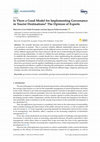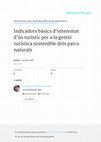Papers by Juan Ignacio Pulido-Fernández

Sustainability
The scientific literature and reports by international bodies recognise the importance of governa... more The scientific literature and reports by international bodies recognise the importance of governance in tourism. This is a process whereby different stakeholders interact in order to solve problems and find opportunities for the different sectors involved. For the purposes of this article, different approaches have been analysed with the aim of understanding the full governance process among stakeholders. In order to validate the main findings, a panel of experts was set up to establish the characteristics a model should have when implementing the principles of good governance as a key tool for managing tourist destinations. This model is aimed at guaranteeing the sustainable development of tourism and enhancing competitiveness. There is a great consensus about how governance must be applied, establishing an open and participatory model which must be transparent and effective, capable of attracting the participation, coordination and collaboration among stakeholders using a clear me...

Demand for nature-based tourism is growing in Spain, following the trend worldwide for over a dec... more Demand for nature-based tourism is growing in Spain, following the trend worldwide for over a decade. National and natural parks characterize most of this growth. This paper provides the methodology for obtaining a set of easy calculation from the statistical sources available today and for the interpretation of results for a sustainable tourism management of natural parks. The implementation of the proposed methodology has been carried out in Andalusia, where the situation regarding the circumstances raised is very similar to living the rest of the regions. La demanda de turisme de naturalesa està creixent a Espanya, seguint la tendència marcada a nivell mundial des de fa més d’una dècada. Els parcs nacionals i naturals protagonitzen la major part d’aquest creixement. Aquest article proporciona la metodologia per a l’obtenció d’un conjunt d’indicadors de fàcil càlcul a partir de les fonts estadístiques disponibles actualment, així com per a la interpretació dels resultats amb la fi...
International Journal of Sustainable Development & World Ecology, 2016
Journal of Destination Marketing & Management, 2016
Czech Journal of Tourism, 2015
Turismo Sostenible Un Enfoque Multidisciplinar E Internacional 2005 Isbn 84 7801 797 6 Pags 73 108, 2005
Turismo Y Gestion De Espacios Protegidos Xii Congreso Internacional De Turismo Universidad Y Empresa 2010 Isbn 978 84 9876 692 9 Pags 17 50, 2010
Gestion Estrategica Sostenible De Destinos Turisticos 2013 Isbn 978 84 7993 229 9 Pags 521 578, 2013
The Routledge Handbook of Cultural Tourism, 2008
EDULEARN16 Proceedings, 2016
Turismo E Natureza Na Eurrexion Galicia Norte De Portugal Celebrado En Pontevedra Do 12 Ao 15 Xullo De 2005 2006 Isbn 84 8158 312 X Pags 11 38, 2006
Documentos De Trabajo, 2007
UNIVERSIDAD DE JAÉN Departamento de Economía Edificio D-3. Despacho: D3-273 Campus de Las Lagunil... more UNIVERSIDAD DE JAÉN Departamento de Economía Edificio D-3. Despacho: D3-273 Campus de Las Lagunillas, s/n 23071 Jaén jipulido@ujaen.es ... 1 Área de Economía Aplicada. Departamento de Economía. Universidad de Jaén. 2 Departamento de Economía General y Estadística. ...
A Distancia, 2003
... Turismo de naturaleza y sosteniblidad: 1. Ecoturismo. 2. Las gestión turística sostenible de ... more ... Turismo de naturaleza y sosteniblidad: 1. Ecoturismo. 2. Las gestión turística sostenible de los espacios naturales. Autores: Juan Ignacio Pulido Fernández; Localización: A distancia, ISSN 1133-1151, Nº 1, 2003 , págs. 32-46. Fundación Dialnet. Acceso de usuarios registrados. ...
Turismo Cultural 2013 Isbn 978 84 9958 879 7 Pags 143 170, 2013
Planificacion Y Gestion Del Turismo En El Medio Rural Ponencias De Las Primeras Jornadas De Planificacion Vinculadas Al Plan Senda Celebradas En El Centro De Turismo Interior De Andalucia Entre Los Dias 13 Al 18 De Noviembre De 2000 2001 Isbn 84 8176 412 4 Pags 191 226, 2001
Información del artículo Turismo y desarrollo sostenible: Sierra Mágina y su área de influencia.

Papers De Turisme, Oct 31, 2012
Propuesta metodológica para el diseño de un índice sintético de turismo sostenible 27 2007 Palabr... more Propuesta metodológica para el diseño de un índice sintético de turismo sostenible 27 2007 Palabras clave desarrollo económico / sostenibilidad / turismo sostenible / índice sintético, ST INDEX / gestión territorial. Resumen Abstract T his paper establishes the methodological bases for the design of a global synthetic index for the measurement of the sustainable tourism development. ST INDEX is the denomination for this index. Its calculation fi ts to the fourfold dimension of sustainability, thus allowing monitoring and control of results of development policies for sustainable tourism. It also serves as a measuring element of convergence among different tourism destinations. It provides a greater level of knowledge on the elements that condition its competitiveness in marketplaces as well. The design of synthetic indexes of sustainable development is a very recent proposal, so theoretical contributions to this fi eld are still very scarce. As for sustainable tourism, no advance has taken place yet, that is the reason why the issue proposed in this paper proves to be a novelty. The authors have taken into consideration as Keywords economic development / sustainability / sustainable tourism / synthetic index / ST INDEX / territorial management.
Revista De Estudios Empresariales Segunda Epoca, 2007

Tourism Analysis, 2014
ABSTRACT The purpose of this article is to analyze tourism destination competitiveness (TDC) from... more ABSTRACT The purpose of this article is to analyze tourism destination competitiveness (TDC) from a demand point of view, evaluating the relevance of different TDC determinants and trying to provide an explanation about how these determinants affect tourists' choices. Specifically, this article proposes a structural equation model for TDC, based on theoretical TDC models. Secondly, the model is tested using a sample of tourists who visited the Spanish region of Andalucía in 2010. After fitting the model, an alternative model is proposed, offering a superior explanation about how destination attributes influence TDC in terms of tourists' duration of the stay, expenditure at the destination level, or the degree to which the destination matches their prior expectations. The main contribution of this article is that the determinants of TDC are evaluated from a demand point of view (tourists' perceptions of the attributes that define the tourism destination value proposition) instead of a supply point of view (destination managers' opinions or experts' judgments). Consequently, some light is shed about how the main factors determining TDC are modulated by tourist perceptions. The relevance of this approach rests on the fact that tourists have the last word when choosing their holiday destination; therefore, it exposes a destination's ability to attract tourists and to provide satisfactory experiences to assure its own competitiveness. Paradoxically, despite the relevance of tourism demand as a factor to explain TDC, very few studies have analyzed TDC from a tourist or demand perspective. Finally, existing theoretical models explaining TDC do not establish causal relationships between its determinants. This article, however, identifies connections between TDC determinants, as well as the influence of these relationships and determinants over TDC.

Uploads
Papers by Juan Ignacio Pulido-Fernández